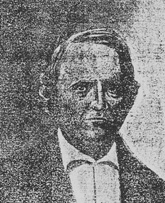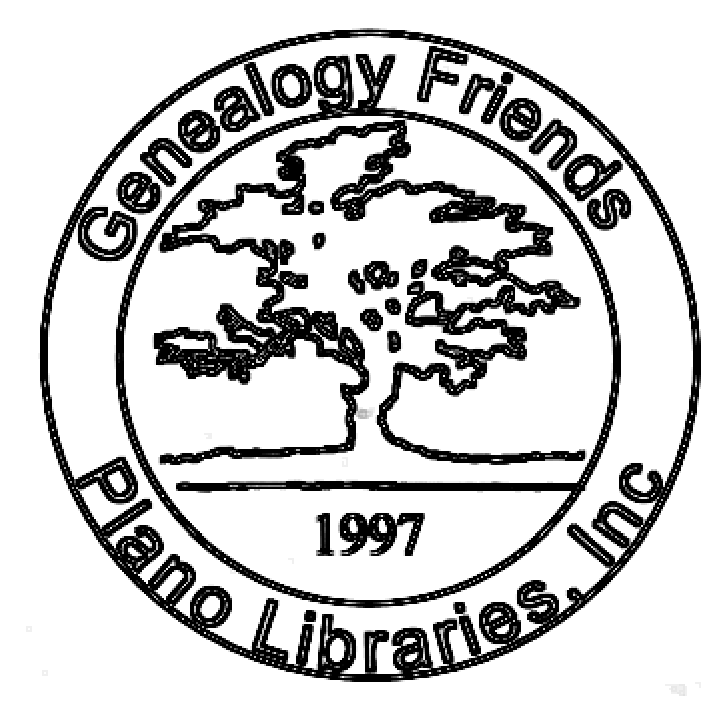COLLIN McKINNEY

Historical
marker, Van Alstyne cemetery, 1968
COLLIN McKINNEY
(April 17,
1766 - September 8, 1861)
A PIONEER
LEADER OF NORTH TEXAS AND SIGNER OF THE TEXAS
DECLARATION OF INDEPENDENCE, COLLIN McKINNEY WAS BORN IN NEW
JERSEY, A
SON OF SCOTTISH IMMIGRANT PARENTS. IN 1780 THE FAMILY
MOVED TO
KENTUCKY AND IN 1824 McKINNEY MIGRATED ACROSS THE
RED RIVER
AND SETTLED NEAR PRESENT TEXARKANA.
IN
JANUARY, 1836, HE WAS ELECTED A DELEGATE TO THE GENERAL
CONVENTION
AT WASHINGTON-ON-THE-BRAZOS AND THERE SERVED ON
A
COMMITTEE OF FIVE THAT DRAFTED TEXAS' DECLARATION OF INDE-
PENDENCE
FROM MEXICO. ON MARCH 2, HE SIGNED THE DOCUMENT.
HE ALSO
SERVED ON THE COMMITTEE WHICH PREPARED THE CONSTITU-
TION FOR
THE REPUBLIC OF TEXAS. LATER HE SERVED IN THE 1ST, 2ND,
AND 4TH
CONGRESSES OF THE REPUBLIC. IN PRIVATE LIFE, McKINNEY
WAS A
LEADER IN ESTABLISHING THE FIRST DISCIPLES OF CHRIST CHURCH
IN TEXAS.
IN 1846 HE
SETTLED NEAR THE GRAYSON-COLLIN COUNTY LINE;
THIS
BECAME HIS PERMANENT RESIDENCE. IN 1792 HE MARRIED AMY
MOORE:
THEY HAD FOUR CHILDREN. HE AND HIS SECOND WIFE BETSY
LEAKE
(COLEMAN), BY WHOM HE HAD SIX CHILDREN, ARE BOTH BURIED
IN THIS
CEMETERY.
COLLIN
COUNTY AND ITS SEAT, McKINNEY, WERE NAMED IN HIS
HONOR. IN
1936 TEXAS CENTENNIAL COMMISSION HAD HIS HOUSE
MOVED TO
FINCH PARK IN McKINNEY.
ERECTED BY
THE COLLIN McKINNEY HEIRS.
COLLIN McKINNEY
A
TEXAN WHOSE GOOD DEEDS LIVE AFTER HIM
Dallas
Morning News, May 5 1907
Farmersville, Tex., April 26--The death last month of Rev. Y. S. McKinney at
Van Alstyne, Tex., in his eighty-eighth year and duly noted in The News,
calls for a tribute to the memory of this useful man and a sketch of his
widely noted father, Collin McKinney, for whom the populous county of Collin
and the wealthy little city of McKinney were named in the early dawn of
Texas independence.
Rev. Younger Scott McKinney was born in Kentucky when it was a veritable
"dark and bloody ground" and at 5 years of age was brought to Texas by his
parents. For nearly eighty-three years, then, he lived and wrought in this
goodly land and the work of his spirit remains a living monument to his
Christian virtues and manly excellences. He has but recently passed away and
his godly life and admirable characteristics are fresh in the minds of the
large number of men and women who knew him and the scarcely less large
number who received from him the benefit of social contact and the inherent
uplift of moral greatness which attached to his daily walk.
Y.
S. McKinney belonged to our own times, but his father was of another era and
though formal history accords him an honorable place within its covers, it
is meet to recall from time to time the labors an difficulties over
which he and his kind triumphed in the founding of our great commonwealth.
In the Farmersville Times of Oct. 22, 1904, appeared a biographical sketch
of Collin McKinney, with an authenticated portrait, which will doubtless
interest many readers of The News. The following excerpts are submitted,
together with the portrait:
Probably no other person influenced the destiny of North Texas more than
Collin McKinney. In the beginning we wish to say that the accompanying
representation of his likeness is the only authentic one. It is probable
that there have been what purported to be his portraits, but they were not.
Our townsman, J. T. DeShields luckily secured from Mr. McKinney's daughter,
Mrs. Milam, a faded picture several years ago and at once had an oil
portrait painted by the artist, McArdle, from this, thus saving to the world
the likeness of a great and good man. Mr. DeShields as a matter of
protection has had this copyrighted and it can not be used without his
consent.
Collin McKinney was born in New Jersey April 17, 1766, his father coming
over to this continent from Scotland. The family had been in America some
fifteen years when Collin was born. His father was one of the "tea party"
whose action at Boston rang around the world and aroused the patriots to
resist the mother country. When Collin was yet a small boy his father and
family moved to Virginia and in 1780 moved to Kentucky and settled near what
is now Crab Orchard. The place where he located was called McKinney Station
and it is said to yet carry this name. The family remained in Kentucky till
1824, living at different times in nearly every county in the State from the
northern to the southern lines.
Collin McKinney was therefore one of the Kentucky pioneers, fighting the
Indians and otherwise protecting the frontier. While a boy he narrowly
escaped death from the red men. He was hunting his father's horses, and
hearing the bell, went through the little clearing instead of around, thus
missing the Indians hidden in the fence corners. He had proceeded only a
short distance when he heard the help of a turkey, and knowing the tactics
of the red men, he jumped behind a tree, then another and another, putting
each between him and the direction from which came the yelp. By this method
he was able to reach the horses and drive them to the cabin, though very
much agitates, so much so that he was unable to eat breakfast. Understand
that he did not know that the help of the turkey was the noise of an Indian
and his action in this was only precautionary. Just as the family was
teasing him about his nervousness a frontiersman appeared on the scene and
informed them that Indians were in the neighborhood and that parties had
been fired upon near by and across the clearing in the direction from which
came the noise that agitated Collin. It was found upon investigation that
five had been secreted in the fence corners and his quick action was the
only reason why he escaped with his life and to the career which awaited
him. This illustrates his great caution, a trait that saved him on many
occasions.
Collin McKinney was married twice. The first time to Miss Annie Moore, Feb.
13, 1793. Four children were born to them, two of whom, Ashley and Polly,
lived to be grown. This wife died May 6, 1804. His second marriage was
solemnized April 14, 1805. Miss Betsy Coleman being the bride, a daughter of
Samuel Coleman of Todd County, Kentucky. To them were born five children,
William C., Annie and Margaret, and twins, Eliza and Younger, the latter
being the only one now living (in 1904). Eliza dying a few months since at
her home near Van Alstyne at the age of 91 years.
Sept. 15, 1824, Collin McKinney and family arrived at a point six miles east
of Texarkana, believing that they were in Texas. Later they moved further
west and settled on Hickmans' prairie on Red River, then Miller County,
Arkansas, but now Bowie County, Texas. This was in 1831. He remained at this
place till 1846, when he moved his family to a point which now is near the
line of Collin and Grayson Counties, where he continued to live till the day
of his death, which was Sept. 8 , 1861. His remains await the end of the
world in the Van Alstyne Cemetery.
Collin McKinney was a member of the convention which declared that Texas was
a free and independent Nation and no longer a State of Mexico. He signed the
Declaration of Independence and assisted in forming the Constitution of the
Republic. He sat in the first four Congresses of the new Nation,
representing what was then Red River County, it covering a large portion of
East and North Texas at that time. Preceding this period, however, he was a
member of the provisional government of 1835, before the declaration of
independence was given to the world on March 2, 1835. His youngest son saw
service in the war for independence. Though Mr. McKinney retired from active
life long before his death, he took great interest in the welfare of his
State and county, as well as the Nation. Whenever he felt that the time had
come for him to speak out his countrymen heeded his wisdom in matters of
public moment. To him probably more than to any other person is due the
present shape of the several tiers of counties along the northern part of
the State. He contended for counties as nearly thirty miles square as
circumstances would admit and he largely succeeded in these contentions. His
schooling was limited to a few weeks in early years, be he was a man of very
fine natural ability and as the responsibilities of life fell to his lot he
was found fully prepared to meet every requirement. He was Magistrate in
Kentucky from 1805 till he came to Texas, and after reaching Texas was made
Magistrate and served in this capacity for some time, probably till the year
1839.
Mr.
McKinney was a strong opponent of Sam Houston, especially when the latter
undertook to make the Republic recognize the Cherokee Indian as a citizen.
Houston was bound to this tribe by close ties. Mr. McKinney could hardly
tolerate Houston's characteristics, they were so offensive to him. However,
he voted in the provisional assembly to make him commander in chief of the
Texas armies, because he regarded him as the best fitted for the important
position, one upon which largely hinged the independence of the infant
republic and not because he liked him in the least.
This brief biography of Collin McKinney is not intended as a comprehensive
statement of his career, wholely or in part, it being largely taken from an
interview once given by his daughter, Mrs. Milan, which set forth only a
very few important acts in his devotion to his Nation and his State
throughout a long career on the frontier and in his entirely spent in trying
times when events of worldwide importance were transpiring. Collin McKinney
was a citizen of eight different governments during his life. He was born a
subject of King George III; afterward a citizen of the colonial Government
of the Thirteen colonies; a citizen of the United States; a citizen of
Mexico; a citizen of the Provisional Government, established by the Texans
in 1835; a citizen of the Texas Republic till annexation and then of
the United States again, and when death came it found him a citizen of the
Southern Confederacy, Texas having acceded before his demise, making a
career experienced by few men of any time.
Collin McKinney was religiously turned and early in life was a Free Will
Baptist and before the end of life he became connected with the Stone or
Schismatic wing of the Christian Church. He was liberal in his views and
stood out on a broad platform of humanity. It is said he was never known to
turn away any one in need if it were possible for him to assist in any way
regardless of money.
He
was about 6 feet tall, full chested and well built. He had a high forehead,
a prominent nose, dark keen eyes, thin lips, cheek bones not overly
prominent and always went clear shaven. His average weight was about 165
pounds.
Mr.
McKinney's untiring efforts on behalf of the Provisional Government and the
Republic of Texas were rewarded by this county being named Collin, his given
name; and the county seat McKinney, his surname; and in this wise, at least,
his name will be handed down to future generations.
[Note: Collin McKinney's father was born in New Jersey, not Scotland. There
is no evidence that his father every left New Jersey to take part in the
Boston Tea Party.]
OLD LETTER WRITTEN BY COLLIN McKINNEY IN
1845 GIVEN TO HAMMOND MOORE
The Weekly
Democrat Gazette
July 22, 1937

